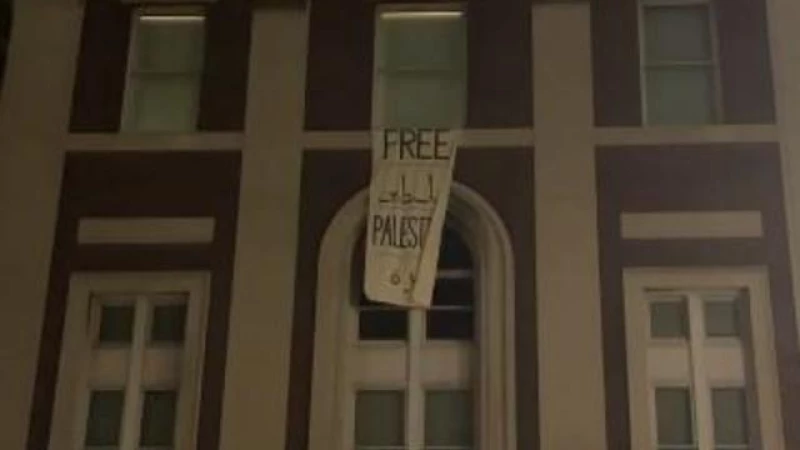NEW YORK -- Demonstrators at Columbia University's campus took over Hamilton Hall early Tuesday, a building famously occupied during anti-Vietnam War protests in 1968.
Speaking to a crowd outside the building, one protester declared, "We demand Columbia's complete financial divestment from entities profiting from Israeli apartheid, genocide, and occupation in Palestine. Our demands will not be silenced until every inch of Palestine is liberated."
A group representing the protesters released a statement outlining their demands.
The New York Police Department confirmed the presence of officers outside the campus. CBS News producer Sean Herbert observed a small group of officers in one area and more officers in another location.
CBS News has contacted the university and its police department for a response to the situation.
The demonstrators displayed a large banner from a Hamilton Hall window with the message "Free Palestine" — captured in the image below from a video recorded by Herbert:
Additionally, they unveiled a banner renaming the building Hind's Hall, in honor of Hind Rajab, a six-year-old Palestinian who lost her life in Gaza three months ago.
Earlier, a group of protestors announced the establishment of a second encampment on campus.
Columbia University began suspending students on Monday who refused to vacate the protest encampment by the 2 p.m. deadline set by the school.
However, as night fell and Tuesday loomed closer, the majority of students interviewed by CBS New York expressed their intention to stay put.
It remained uncertain whether the university would seek assistance from the NYPD to dismantle the encampment. Columbia's campus is private property, requiring police intervention only upon request from the administration.
During the day, hundreds of students marched and gathered in solidarity with their peers, who had been camping on the lawn for almost two weeks in support of Palestinians.
Following several days of negotiations with the protestors, Columbia University declared an impasse. While the university stated it would not disinvest from Israel, it did propose to assess student recommendations and enhance transparency regarding the institution's investment portfolio.
Nevertheless, these offers did not satisfy the pro-Palestinian demonstrators.
As the deadline passed, some faculty members linked arms to shield the encampment, including Reinhold Martin, a professor of architectural history.
"We are here to safeguard their right to express their political views in a peaceful manner," Martin affirmed.
Students File Lawsuit Against Columbia University
A group of students filed a federal class action lawsuit against Columbia University, accusing the institution of failing to protect them against antisemitism and harassment, which they claim violates the university's own policies.
Attorney Jay Edelson stated, "If they can enforce their procedures and restore campus to some sense of normalcy, then the lawsuit will go away."
Consequences for Remaining Students
In response to ongoing protests, the Columbia administration sent a letter to students outlining the consequences of their actions. Students were given until 2 p.m. to voluntarily leave the encampment and sign a form agreeing to abide by university policies in order to remain in good standing for the semester.
Those who chose not to comply would face suspension, being barred from completing the semester, graduation (for seniors), and access to campus facilities and housing.
Student negotiator Mahmoud Khalil expressed determination, stating, "The students made it clear they're willing to stay here as long as needed to achieve their demands."
Support for the pro-Palestinian cause was also evident, with student Michael Ostuno declaring, "They're standing up for what is right and I'm standing up for them."
"I am happy Columbia is taking a stance to protect its Jewish and Israeli student body who have been fearful these past few weeks," one student said.
One student said he came to campus for the last day of classes despite having a virtual option.
"To show I'm not afraid and growing up in Israel a big recurring theme was 'never again' and I don't think Jews should be intimidated," the student said.
Graduation is scheduled for May 15 on the same lawn where the encampment is.
Encampment set up at Rutgers University
Students at Rutgers University set up an encampment at the New Brunswick campus on Monday after first holding a rally and then marching to the location.
They're trying to get the attention of the university's Board of Governors and the Joint Committee on Investments after they felt their request for the school to divest from Israel was ignored at a meeting on Thursday.
Earlier this month, more than 6,000 students voted in favor of a referendum calling on university administrators to withdraw investments in Israel and cancel the school's partnership with Tel Aviv University. More than 1,500 voted against the idea.
There are 44,000 students enrolled in New Brunswick. Those who spoke to CBS New York at Monday's rally declined to go on camera.
"I stand in solidarity with our students, advocating for their passions and beliefs. I see the importance of divesting as a step towards a more ethical stance for our university," expressed Kaiser Aslam, the Muslim chaplain at the Rutgers Center for Islamic Life.
"As a Jewish individual, I have never felt safer or more welcomed than at these rallies. There is no place I'd rather be," shared Ellen Rosner, a local resident.
Rutgers University is currently reviewing the request, with the school's president emphasizing his personal disagreement with the boycott, divestment, and sanctions movement. He has voiced support for the university's relationship with Tel Aviv University, despite student protests.
During Monday's rally, the president acknowledged the students' desire to make a positive impact on a conflict that has claimed numerous lives. He affirmed their right to protest peacefully without disrupting campus activities or their peers' education.







